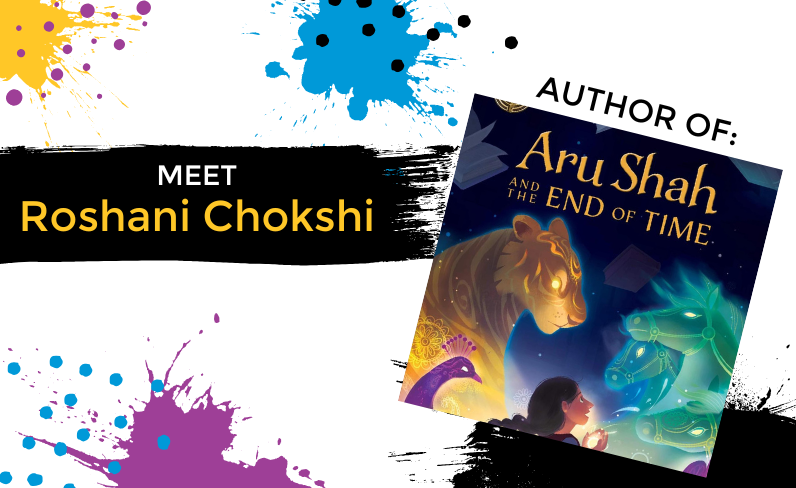Hello Inklings!
This month’s Ink Splat Author Interview features Roshani Chokshi, the award-winning author of the New York Times bestselling series The Star-Touched Queen, The Gilded Wolves and Aru Shah and The End of Time, which Time Magazine named one of the Top 100 Fantasy Books of All Time.
In this month where we’re focused on finding the heart of our stories and poems, we know you’ll love hearing from Roshani about how to courageously and joyfully tap into your life, your perspective, and your passions as you move the big ideas from your head and heart onto the page.
Learn more about Roshani Chokshi at roshanichokshi.com and on Instagram at @roshanichokshi.

Writing Challenge
In our interview with Roshani Chokshi, we learned about how she loves to take myths, folk tales, and fairy tales, and retell them. This month, we challenge you to choose a myth, folk tale, or fairy tale character and ask some of the questions of them that Roshani asks herself when she writes.
How might it have felt to be in this character’s shoes?
What emotions might they have had?
What physical sensations might they have had?
What do I imagine I might have done, if I’d been in this situation myself?
Take what you notice as you ask your questions and weave the ideas and inspiration into a scene.
How do you go about developing a character from the initial spark of an idea?
A lot of what fascinates me as a writer is retelling and reinventing myths and revisiting fairy tales. A large part of that is because I find many of those myths and fairy tales deeply dissatisfying. When I think about ancient Hindu myths, the storyline might be, “This person looked at me sideways and I got in trouble, and then I got turned into a rock for 10,000 years.” And then the story ends there. Your responsibility, or your calling as a contemporary storyteller, is to look back at a very short myth like this and find ways to expand it. And you do that by considering the character. You consider: Well, who got turned into a rock? How did they feel? Did they find moss growing on their boulder-self ticklish?
Then, you might think about the other person, the one who cursed them, and you visit their perspective. What happened to make it such a terrible day that they said, “You know what? You get to be a rock for 10,000 years.”
There’s so many ways that when we look at these old stories with different lenses, they lend themselves to thousands of endings and beginnings. Particularly when it comes to characters, you can begin by asking yourself: What was like to be them? What did they feel? You unearth the whole person.
Sometimes it’s meshing things together. Sometimes it’s finding the thing that you get a little obsessive over. The final thing I tend to ask myself when I’m working on characters is just one question. What are they ashamed of? I find that to be the humanizing question, that’s the question that makes the characters not only interesting, but deeply relatable. I cannot think of any other animal on the planet that feels shame the way humans do. Many times, we let those feelings guide us and rule us and make our decisions for better or for worse.
Your books each have a strong voice of their own. Is that a decision you make? How does the voice of each of your books come to be?
I’ve found that certain novels want a particular voice. There are certain books that lend themselves to a lot more atmosphere. I’m someone who really loves opulent, delicious, visceral prose, the sort of sentences that you can bite your teeth into. But not every book is like that. I don’t think that Aru Shah and the End of Time series is like that. That series wanted to be written with more emotional urgency, with more focus on the dialogue. Overall, there was just more focus on these characters speaking. I felt like so much of what I was doing was trying to keep up with Aru and her friends and writing down everything that they said fast enough. Consider that style versus a book like The Gilded Wolves, which is historical fantasy. That book wanted to linger in the time and the setting and the importance of that era and how it informed the characters. With The Last Tale of the Flower Bride, I think people either love or hate the voice of that story. It’s a very emotionally intense book, and the language itself is a character. That’s all intentional. All of that to say, I don’t think I decide. I think the book decides for me.
Do you have any advice for our community of youth writers at Society of Young Inklings?
I would encourage you to remember that the person you are now, and the ideas that you have now, the biases that you have, they don’t have to be set in stone. You are a human being. You are allowed to change. You are encouraged to change. So don’t feel as though the talents that you have now are all you’re ever going to have.
There’s so much life ahead of you. I mean this in both a good and bad way, As a society, we’re not very kind to people. When they make mistakes in public, we are particularly cruel. We don’t give them the space as a human being to learn and to grow and to change. I think that when you are a young writer, you are at this unique and tender moment in existence where you can hold all those multitudes. So I encourage you not to be inflexible in your thoughts and your perspectives.
I also think that the best writers are not just voracious readers, but deeply attentive listeners. You will be amazed at the stories of people all around you, if you give them the chance to really, really talk to you. You can always tell when you’re in a conversation with someone who isn’t really listening to you, someone who is simply eager to to get to the part where they get to speak. And I don’t particularly enjoy spending my time with people like that. I think that good listeners have become more and more rare. The more we are better listeners, the more beautiful the art we make will be. That’s my advice to you.

A special thank you to Roshani Chokshi for sharing with us!
Roshani Chokshi is the award-winning author of the New York Times bestselling series The Star-Touched Queen, The Gilded Wolves and Aru Shah and The End of Time, which Time Magazine named one of the Top 100 Fantasy Books of All Time. Chokshi’s adult debut, The Last Tale of The Flower Bride, was a #1 Sunday Times bestseller. Her novels have been translated into more than two dozen languages and often draw upon world mythology and folklore. Chokshi is a member of the National Leadership Board for the Michael C. Carlos Museum and lives in Georgia with her family. Visit her online at roshanichokshi.com and on Instagram at @roshanichokshi.
Check out Roshani’s books and all of our recent Ink Splat authors’ works at our Bookshop.org Store.

INKLINGS CONNECT
Summer Camps
Join us for a writing camp this summer. We can't wait to see what you create!
Keep your creativity flowing with our upcoming community events:

SUBSCRIBE
Subscribe to stay in touch with Society of Young Inklings. You’ll receive our monthly Ink Splat newsletter and be the first to know about upcoming events and ways to connect with Young Inklings.




